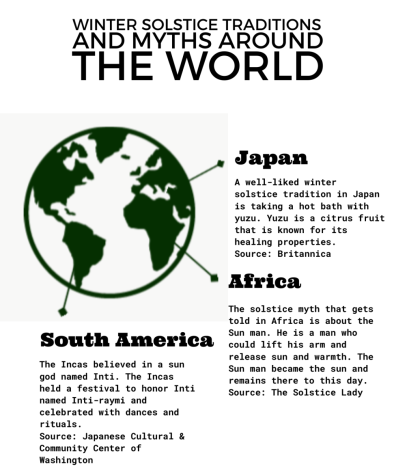Shortest day of the year: Winter solstice in mythology
February 2, 2023

Despite some Americans only valuing winter solstice as the marking of the shortest day of the year, multiple cultures believe the solstice holds greater meaning. Throughout the world, many cultures celebrate the solstice, each in their own unique way.
One class that highlights these traditions in a new unit they study is Mythology run by teacher Anna Fleury. Fleury decided to start a new tradition this year and hold a celebration where the students present and learn about how different cultures celebrate the winter solstice around the world.
“Students get to pick from a list of over 20 different cultures from all around the world, they get to choose which culture and tradition they want, and do some research about what that culture does to celebrate Winter Solstice,” Fleury said. “Then they put together a very nice little slideshow, that’s mostly pictures, and tell us that culture’s myth about solstice, and the traditions that go along with the myth.”
The original plan was to have a Winter Solstice Party, but ended up being a showcase of educational presentations inside. Senior Addison Erickson, believes it was still enjoyable, and that learning the different myths and traditions of cultures all over the world is what makes Mythology and Solstice fascinating.
“We all had to choose from very different topics from very different cultures,” Erickson said. “Some people had African myths, while other people had Japanese and we had Arctic. You really did get a taste for everything with the solstice presentations, they were very unique in that way.”
The presentations educated a lot of students about different cultures and how important it is that societies and their traditions are conserved and passed down. Senior Jermaine Dickens believes this and through the winter solstice presentations learned the importance of myths to cultures throughout the world.
“Cultures use myths especially for the time of solstice as a means of understanding why they carry on the tradition of doing it each year,” Dickens said. “Such as the myth behind the Dongzhi Festival. It’s more than just a story. It’s a reason why. A reason to continue carrying it on.”
Each day the sun goes down sooner, losing a minute of sunlight, until the winter solstice, one of the shortest days of daylight. This is the baseline of truth to the stories all cultures tell from the Dongzhi festival myths to the Japanese sun goddess Amaterasu. Furthermore, according to Erickson mythology influences most aspects of modern life, and mythology’s continued importance is what convinces students to take the class.
“What people don’t realize is that [mythology] really is everywhere and learning some of the stuff we learned in myth, it really changes your viewpoint on the entire world,” Erickson said. “And I feel it makes you a lot wiser to the things around you. It’s just so beneficial to the way you think, and the things that you learn.”











